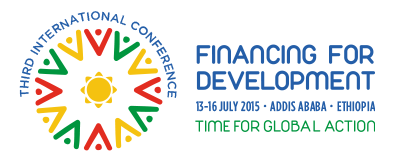In the lead up to agreement on the Addis Ababa Action Agenda (AAAA) by UN Member States at the Third International Financing for Development (FfD3) Conference, the UN Economic Commission for Latin America and the Caribbean (ECLAC) advocated for regional perspectives and priorities to be reflected in the AAAA, organizing side events and bringing to Addis Adaba a proposal for a debt forgiveness mechanism for Caribbean small island developing States (SIDS).
 16 July 2015: In the lead up to agreement on the Addis Ababa Action Agenda (AAAA) by UN Member States at the Third International Financing for Development (FfD3) Conference, the UN Economic Commission for Latin America and the Caribbean (ECLAC) advocated for regional perspectives and priorities to be reflected in the AAAA, organizing side events and bringing to Addis Adaba a proposal for a debt forgiveness mechanism for Caribbean small island developing States (SIDS).
16 July 2015: In the lead up to agreement on the Addis Ababa Action Agenda (AAAA) by UN Member States at the Third International Financing for Development (FfD3) Conference, the UN Economic Commission for Latin America and the Caribbean (ECLAC) advocated for regional perspectives and priorities to be reflected in the AAAA, organizing side events and bringing to Addis Adaba a proposal for a debt forgiveness mechanism for Caribbean small island developing States (SIDS).
ECLAC brought two principal inputs to the Conference: a set of ten key messages from the regional consultation for FfD, and a proposal for debt relief for Caribbean States. The ten key messages stress, among other things: the importance of significant mobilization of domestic resources, including those mobilized by national and sub-regional development banks; the need for creating a sovereign debt restructuring framework; the growing importance of South-South and triangular cooperation; the need to address asymmetries in the governance mechanisms of international financial institutions; making multilateral trade practices and agreements more flexible to take the specificities of middle-income countries into account; the need to meet the challenge of mobilizing private financial resources and channeling them towards development objectives; the need to rethink remittance flows; and greater involvement of civil society in intergovernmental processes.
ECLAC Executive Secretary Alicia Bárcena delivered the debt relief proposal. Under the proposal, the Caribbean Community (CARICOM) would negotiate an agreement with the Caribbean Development Bank (CDB), the World Bank and International Monetary Fund (IMF) to gradually write off the multilateral external public debt of Caribbean countries. In return, the beneficiary countries would make annual payments to a Caribbean resilience fund that could be managed by the CDB. These funds would focus on helping those countries improve resilience to natural disasters, as well as finance climate change adaptation and mitigation measures.
To promote and discuss messages from the region at the Conference and the debt relief proposal, ECLAC, Chile and Colombia co-sponsored a side event. During the event, Bárcena stressed the need for “greater transparency, reciprocity and international cooperation in fiscal and tax areas” to help the region mobilize domestic resources. She underlined the importance of addressing tax evasion, which she said has resulted in a loss for Latin America and the Caribbean surpassing US$150 billion.
The FfD3 Conference was held from 13-16 July 2015, in Addis Adaba, Ethiopia. The resulting AAAA contains more than 100 measures addressing areas such as domestic resource mobilization, technology and innovation, infrastructure, social protections, health, small and medium-sized enterprises (SMEs), climate change and cooperation in combating tax evasion. [ECLAC Press Release on FfD3 Outcome, 16 July] [ECLAC Press Release on Bárcena Remarks at FfD3 Round-table] [ECLAC Press Release on FfD3 Side Event] [ECLAC Press Release on Proposal for Caribbean Debt Relief] [Ten Key Messages of the Latin American and Caribbean Regional Consultation on Financing for Development] [A Proposal for Debt Relief Among Caribbean SIDS]